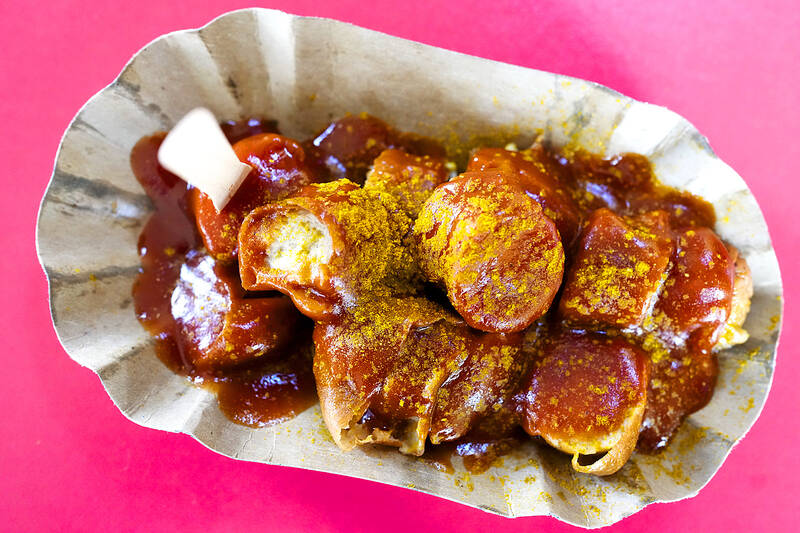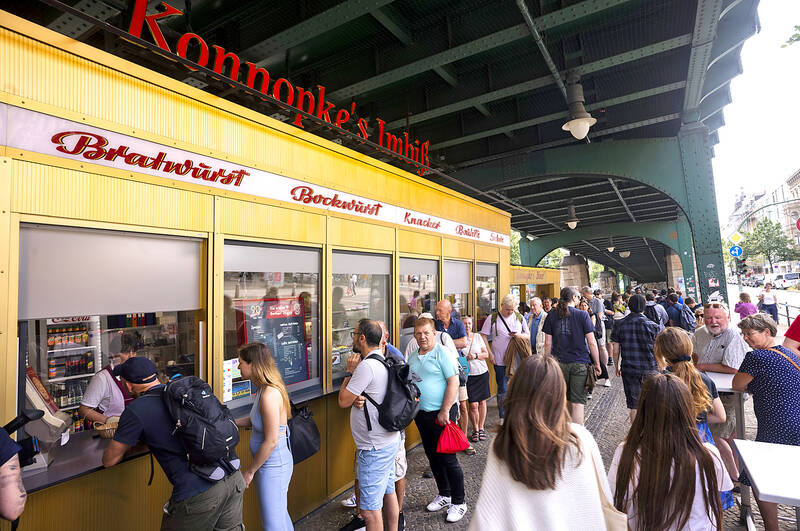Bite-sized bliss. The currywurst is considered a fast-food delicacy in Germany, and the perfect treat before a game.
The Union of European Football Associations (UEFA) said that soccer supporters from across Europe would find this savory German invention on offer at stadiums throughout the country during UEFA Euro 2024, which started on Friday.
The pork sausage garnished with curry sauce is usually presented on a pristine white cardboard platter with a two-pronged plastic fork. It can be served with skin or without — visiting supporters would likely develop their own preference by the end of the month-long tournament.

Photo: AP
While its origins are contested, the currywurst has a special place in the food culture of Berlin.
“Our city is all about currywurst, and I think our city can’t live without currywurst. Whoever comes to Berlin has to try currywurst to know what the city’s about,” said Linda Konnopke, who helps run her family’s popular fast-food joint in the German capital’s Prenzlauer Berg district.
Her great-grandparents Max and Charlotte Konnopke first began selling sausages from their portable grill in 1930, and the family-run business has since become an institution famous for its currywurst, which Gunter Konnopke, their son, introduced to East Berlin in 1960. It was an immediate hit. The recipe is still a closely guarded family secret.

Photo: AP
“Our absolute highlight is our currywurst without skin. That’s our biggest seller,” Linda Konnopke said.
The currywurst is usually sliced into convenient bite-sized portions. It can be doused in ketchup and sprinkled with curry powder, but some vendors — such as Konnopke’s — use their own specific curry sauce.
A woman named Herta Heuwer is largely credited with its invention. Heuwer was one of thousands of Berlin’s “Trummerfrauen” (rubble women), who helped clear the wreckage left after World War II, and afterward she ran her own fast-food business in the borough of Charlottenburg in the west of the city.
Some say Heuwer was bored one day and decided to experiment with the ingredients she had; others that she ran out of mustard and needed an alternative. Either way, she claimed to have invented the currywurst on Sept. 4, 1949.
Berlin proclaimed itself the “currywurst capital” on a plaque honoring Heuwer where she sold her first currywurst, but there are rival claims from Hamburg and the Ruhr area in western Germany.
At the DFB-Pokal soccer final in Berlin last month, Kaiserslautern supporter Luisa Albert said she prefers the currywurst in Kaiserslautern, which is in the state of Rhineland-Palatinate.
As stadium food, it is always a winner, she said.
“Currywurst is the best thing you can eat before a game,” she said. “It gives you the strength to cheer and celebrate and do everything.”
Supporters attending games at Berlin’s Olympiastadion wold be able to get their currywurst from Hertha BSC supporter Ollie Brandt, who has been offering fast-food outside the stadium for more than 40 years.
Brandt takes great pride in offering currywurst sausages manufactured to another longstanding family recipe, but he does not think much of currywurst from outside the capital.
“If you go to the Rhineland, for example, you get a grilled sausage that’s smeared with a sort of curry sauce sold as a currywurst, but that’s no currywurst,” Brandt said as he held up a package of his own sausages. “This here is a real currywurst.”
Brandt said fans would simply have to try the different types and styles to determine their favorite.
“We have I don’t know how many thousands of snack bars all over Berlin, East and West. Everyone does it differently. It doesn’t taste the same anywhere, but it’s still simply unique,” Brandt said. “You have to try it.”

Semiconductor business between Taiwan and the US is a “win-win” model for both sides given the high level of complementarity, the government said yesterday responding to tariff threats from US President Donald Trump. Home to the world’s largest contract chipmaker, Taiwan Semiconductor Manufacturing Co (TSMC, 台積電), Taiwan is a key link in the global technology supply chain for companies such as Apple Inc and Nvidia Corp. Trump said on Monday he plans to impose tariffs on imported chips, pharmaceuticals and steel in an effort to get the producers to make them in the US. “Taiwan and the US semiconductor and other technology industries

SMALL AND EFFICIENT: The Chinese AI app’s initial success has spurred worries in the US that its tech giants’ massive AI spending needs re-evaluation, a market strategist said Chinese artificial intelligence (AI) start-up DeepSeek’s (深度求索) eponymous AI assistant rocketed to the top of Apple Inc’s iPhone download charts, stirring doubts in Silicon Valley about the strength of the US’ technological dominance. The app’s underlying AI model is widely seen as competitive with OpenAI and Meta Platforms Inc’s latest. Its claim that it cost much less to train and develop triggered share moves across Asia’s supply chain. Chinese tech firms linked to DeepSeek, such as Iflytek Co (科大訊飛), surged yesterday, while chipmaking tool makers like Advantest Corp slumped on the potential threat to demand for Nvidia Corp’s AI accelerators. US stock

The US Federal Reserve is expected to announce a pause in rate cuts on Wednesday, as policymakers look to continue tackling inflation under close and vocal scrutiny from US President Donald Trump. The Fed cut its key lending rate by a full percentage point in the final four months of last year and indicated it would move more cautiously going forward amid an uptick in inflation away from its long-term target of 2 percent. “I think they will do nothing, and I think they should do nothing,” Federal Reserve Bank of St Louis former president Jim Bullard said. “I think the

Cryptocurrencies gave a lukewarm reception to US President Donald Trump’s first policy moves on digital assets, notching small gains after he commissioned a report on regulation and a crypto reserve. Bitcoin has been broadly steady since Trump took office on Monday and was trading at about US$105,000 yesterday as some of the euphoria around a hoped-for revolution in cryptocurrency regulation ebbed. Smaller cryptocurrency ether has likewise had a fairly steady week, although was up 5 percent in the Asia day to US$3,420. Bitcoin had been one of the most spectacular “Trump trades” in financial markets, gaining 50 percent to break above US$100,000 and